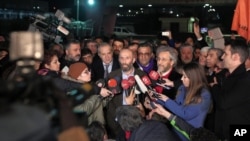Turkey's top judge asserted his court's independence on Tuesday after President Tayyip Erdogan and the justice minister both criticized a ruling that the detention of two prominent journalists had violated their rights.
Erdogan said on Sunday he neither recognized nor respected Thursday's ruling by the constitutional court that led to the release of Can Dundar, editor-in-chief of the opposition Cumhuriyet newspaper, and its Ankara bureau chief.
Their arrest last November, after Cumhuriyet published video footage purporting to show the state intelligence agency helping to send weapons to Syria, drew international condemnation and concerns about media freedom in Turkey, which aspires to join the European Union membership.
"Decisions taken by the constitutional court using its authority, are binding for everyone and every institution," court chairman Zuhtu Arslan told a legal conference in Ankara.
"We are doing our job. We do not look at who is making the application. We are not on anybody's side or against anyone."
Arslan's predecessor, Hasim Kilic, clashed with Erdogan several times, warning last year that the judiciary could become an "instrument of revenge" for politicians after government-backed candidates strengthened their grip on key courts, heightening concern about judicial independence.
Turkish Justice Minister Bekir Bozdag echoed Erdogan's criticism of the court ruling on Tuesday, telling parliament the ruling was a "clear violation of the constitution and law", according to the state-run Anadolu news agency.
The Cumhuriyet newspaper infuriated Erdogan last May when it published photos, videos and a report that it said showed Turkish intelligence officials transporting arms to Syria in trucks in 2014.
The two Cumhuriyet journalists were charged with intentionally aiding an armed terrorist organization and publishing material in violation of state security.
Erdogan, who has cast the newspaper's coverage as part of an attempt to undermine Turkey's global standing, has said he will not forgive such reporting.
"This has nothing to do with press freedom. This is a case of spying," he said on Sunday.
Despite their release, the two journalists are still facing possible life sentences at a trial due to start on March 25 and they are banned from leaving the country.





